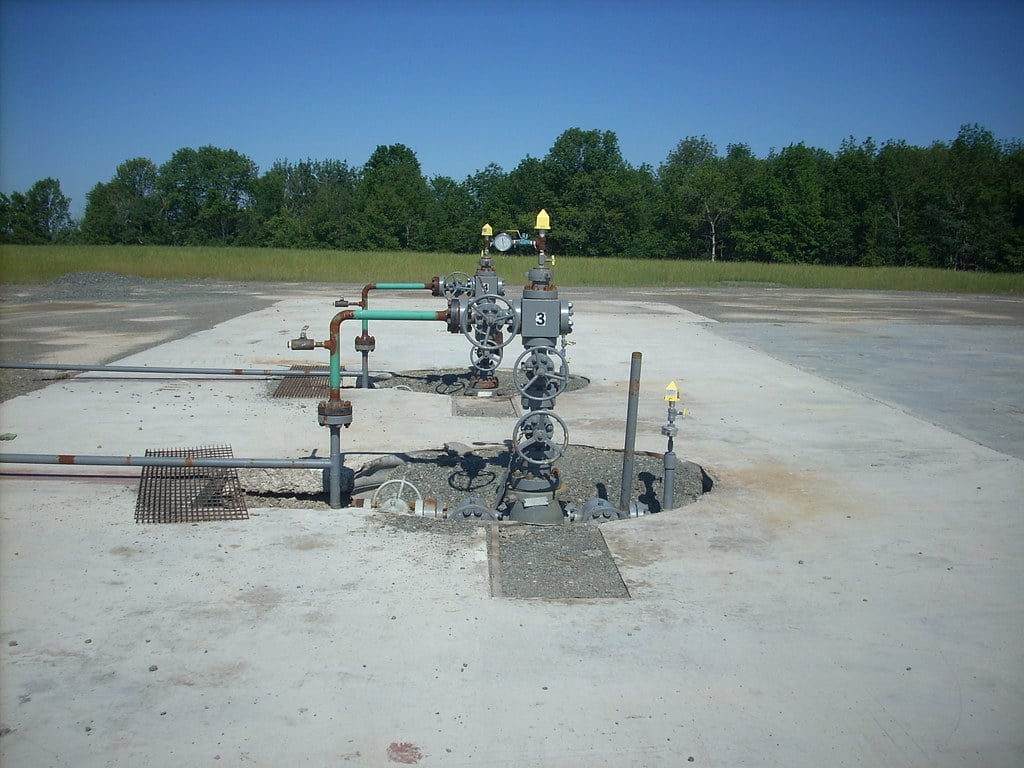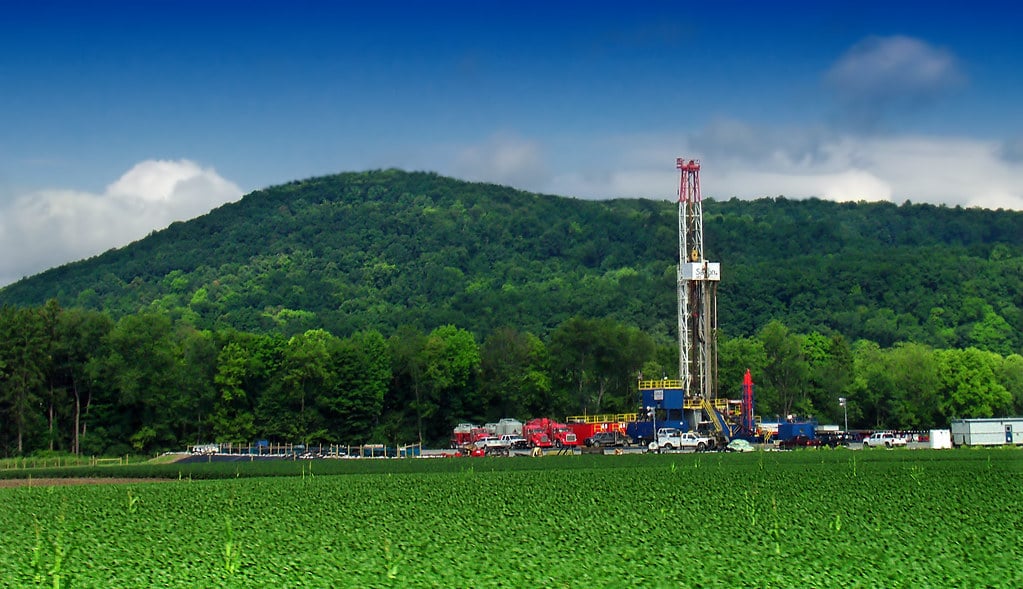The U.S. Supreme Court this week ruled in favor of a natural gas pipeline taking state land for the project’s construction. The decision could set a powerful precedent expanding the use of eminent domain on state-owned land – a mechanism more often wielded by industry to acquire private land.
While opponents of the pipeline called the ruling “devastating,” highlighting the need to limit new fossil fuel infrastructure in order to tackle climate change, other hurdles remain in the pipeline’s path. Experts point to tools at the state level and a separate recent legal decision which could all block or delay the proposed 116-mile PennEast pipeline.
If constructed, the pipeline would carry Marcellus shale gas from Luzerne County, Pennsylvania, across the Delaware River and to Mercer County, New Jersey where it will be delivered to utilities for electricity. The court case pitted the private PennEast Pipeline company – owned by five energy companies, including a subsidiary of Enbridge – against the state of New Jersey, which sought to block the seizure of state land.
While eminent domain is typically used to take private land, New Jersey contended that PennEast could not take state or private land that had environmental easements for the project’s construction.
But in the highly-anticipated decision, on June 29 the Supreme Court ruled in a 5-4 decision that because the company had obtained a federal certificate under the Natural Gas Act from the Federal Energy Regulatory Commission (FERC), it also obtained the authority to use eminent domain to take the land needed for the project, including state land. The decision overturned a lower court ruling in 2019 that backed New Jersey.
“We are pleased that the Supreme Court kept intact more than seven decades of legal precedent for the families and businesses who benefit from more affordable, reliable energy,” Anthony Cox, chair of the PennEast board of managers, said in a statement.
Opponents of the project, however, castigated the decision. “As we face the existential crisis of climate change, it is devastating that our highest Court has chosen to embolden fossil fuel companies, empowering them to trample over the rights and obligation of our state governments to protect its natural resources for the benefit of its residents, communities and future generations,” Maya van Rossum, CEO of the Delaware Riverkeeper, an environmental group fighting the project, said in a statement. “It is so disturbing that the profit making goals of a private pipeline corporation would be given greater respect and protection than the rights of states and people,” she said.
The pipeline would cross more than 88 waterways, 44 wetlands, 30 parks, and 33 conservation easements, according to the Sierra Club New Jersey Chapter. In addition, climate experts warn that both the production and consumption of fossil fuels needs to wind down if the world is going to head off catastrophic climate change.

In an email to DeSmog, Jennifer Danis, a senior fellow at the Sabin Center for Climate Change Law at Columbia University, also criticized the decision, saying that a “narrow majority rewrote both constitutional law and our country’s history in an outcome-oriented ruling.”
States cannot be dragged into federal court by private companies against their will, a concept spelled out in the 11th amendment to the U.S. constitution. But the Court upended that “well-settled doctrine” when Chief Justice John Roberts, through this ruling, put eminent domain “on a pedestal,” arguing that states surrender their rights on this issue, Danis said. Danis counseled the New Jersey Conservation Foundation, a conservation organization that owned multiple threatened properties together with New Jersey and was involved in the case.
Danis added that the decision will make it easier for private parties who have obtained the use of eminent domain – from a FERC approval, in this case – to take state-owned land. Prior to this decision, states opposed to certain projects had more power to block the taking of state land.
A Thicket of Legal Obstacles
However, the victory for PennEast comes with several large caveats. First, there are very few circumstances involving fossil fuel companies condemning state land against the state’s will. Typically, many states are supportive of pipeline projects, so they do not block the taking of state land, but simply require compensation in some form. The precedent set by the Supreme Court would therefore likely impact very few other pipeline projects.
“Thankfully, the consequences [from the Supreme Court decision] for gas pipelines are relatively insignificant,” Danis said.
Moreover, there are several other legal levers that states have to block pipeline projects they don’t want, such as Clean Water Act permits. In the case of PennEast, New Jersey has already denied a water permit, effectively blocking its construction for now.
New Jersey remains steadfastly opposed to the project. In the wake of the Supreme Court decision, New Jersey’s Attorney General vowed to continue opposing the pipeline.
We're disappointed by today’s SCOTUS ruling on the PennEast pipeline, but our fight is far from over. I'm proud to continue standing up for our residents & championing environmental protection. I urge the feds to take another look at this harmful proposal. https://t.co/vcrPYR4doQ
— AG Gurbir Grewal (@NewJerseyOAG) June 29, 2021
PennEast also faces another problem, which points to growing legal headwinds at the federal level, the Supreme Court decision notwithstanding. The original certificate that PennEast obtained from FERC – the same one that gave the company the power to use eminent domain – may now face renewed scrutiny.
A week before the PennEast decision, an entirely separate case in the U.S. Court of Appeals for the District of Columbia Circuit resulted in the court shooting down a FERC permit for a natural gas pipeline that would run from Illinois to Missouri.
Rather than signing up customers, the so-called Spire STL pipeline hadn’t inked agreements with any companies to take the gas other than from an entity affiliated with the pipeline developer itself. Because the company would only be shipping gas to a related entity, the court said that FERC had not adequately demonstrated that the pipeline was in the public interest because there was no obvious need for it.
That decision could impact PennEast, which also hasn’t adequately demonstrated that the project is needed, according to Danis. “Spire made clear that the court cares about having a record showing that there is true demand for the proposed new gas pipeline,” Danis told DeSmog. “PennEast isn’t that project.” Roughly three-quarters of the gas that would move through the pipeline would go to affiliates of PennEast.
Legal challenges against PennEast’s FERC certificate were on hold while the Supreme Court considered the question over state’s rights and the use of eminent domain. With that out of the way, environmental groups, including Delaware Riverkeeper, can proceed with their challenge to the FERC permit. The recent Spire decision bolsters their case.
As a result, despite the Supreme Court victory, PennEast still faces a thicket of legal obstacles.
“We are so far away from PennEast being considered a done deal,” Maya van Rossum of the Delaware Riverkeeper said.
Are Pipelines in the Public Interest?
Still, PennEast has the power to condemn land and take it, even if it ultimately does not move forward with the project. DeSmog previously reported on a similar dynamic in Oregon, where the backer of the Jordon Cove LNG project and the associated Pacific Connector Gas Pipeline has the power to use eminent domain for a project that looks increasingly unlikely to ever go forward.
“That’s a loss for the many farms and homeowners who have no ready way to get those lands back when the project doesn’t get built,” Danis said, referring to landowners in New Jersey.

When asked about the Supreme Court decision, other experts pointed to broader concerns about why a fracked gas pipeline would be in the public interest in the first place. “The whole rationale for eminent domain, especially in a country with some of the strongest private property protections in the world, is that sometimes a taking is necessary to enhance the public good – like building a highway, rail line, or national park,” Colin Jerolmack, associate professor of sociology and environmental studies at New York University, told DeSmog via email.
Jerolmack’s recently published book, “Up to Heaven and Down to Hell,” dives deep into the conflicts that arise from private property, eminent domain, and the impacts of fracking in Pennsylvania.
“I don’t see how taking private property for fracked gas can be justified as a public good in this day and age. It’s become widely acknowledged, even among petroleum company shareholders and investors, that we must quickly and dramatically pivot away from fossil fuels to avert catastrophic climate change,” Jerolmack said.
Globally, natural gas projects have run into trouble obtaining financing and getting off the ground as investors increasingly cast a skeptical eye. Major gas infrastructure, which tends to have lifespans that last several decades, runs the risk of getting stranded as the world shifts to cleaner energy.
But the period of the federal government rubberstamping fracked gas pipelines, a practice that characterized the drilling frenzy over the past decade, may be nearing an end. Danis said that “federal courts are already treating FERC’s pipeline authorization process with increasing skepticism.” The D.C. Circuit’s decision in the Spire case may mean that FERC will have more trouble greenlighting a pipeline in which the pipeline developer and the customer are related.
Also, another case in 2019 called into question whether FERC can approve a project when the gas is mostly for export, not consumed in the region. That question is also at play with Jordan Cove: whether an LNG project is in the public interest if the gas is destined to go abroad. The D.C. Circuit will take up that question later this year.
In addition to more scrutiny from federal courts, FERC itself may begin to change. The term of FERC commissioner Neil Chatterjee, a Trump appointee, expired at the end of June. President Biden is expected to soon appoint his replacement, which could change the makeup of the powerful energy regulator in a less industry-friendly direction. Natural gas pipelines could lose sway at the federal level.
Finally, what is in the public interest, and whether new pipelines are needed, are questions that will be increasingly relevant as the climate crisis grows worse and the energy transition accelerates.
Danis said: “[E]xisting gas demand in this country is going to decrease – not grow – as renewables comprise more of the electric generation, and as we strive to make essential changes over the next decade to make sure we have a reasonably habitable planet.”
Subscribe to our newsletter
Stay up to date with DeSmog news and alerts






